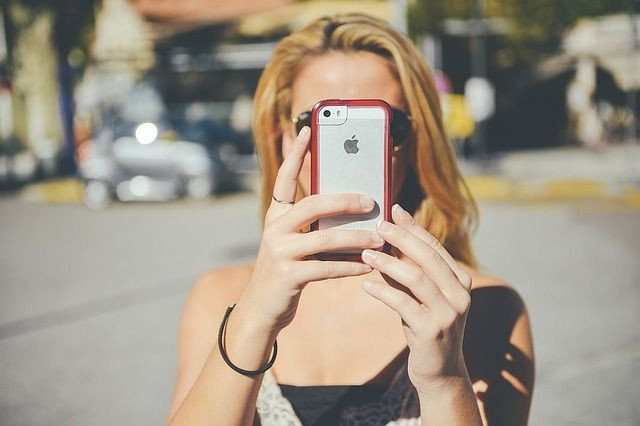Smartphone-Induced Temporary Blindness: Using Your Phone Before Bed Could Cause Vision Problems

Smartphones were recently named one of the most important inventions of the 21st Century and they have changed how we live our lives in countless ways. Now everything from ordering food, sending work emails, and speaking with friends and family across the world can be accomplished with a single device. However, a new report suggests that there may be unsettling health consequences linked to excessive smartphone use: temporary blindness.
According to the report published in the New England Journal of Medicine, two women in England may be the first patients ever to be diagnosed with smartphone-induced blindness. Both women reported having temporary vision difficulties in only one of their eyes.
The first patient, a 22-year-old woman, complained that she had trouble seeing out of her right eye at night while she was in bed and could only see the outlines of objects. Her vision in her left eye remained fine, and her right-eye vision returned each morning, Live Science reported. These temporary blindness episodes occurred a few times a week for a year. Each time, the patient said she could see only the outlines of objects with her right eye, although her vision was fine in her left eye, and had recovered in both eyes the following day. The second patient, a 40-year-old woman, told doctors that she couldn't see out of one eye for about 15 minutes each morning when she woke before sunrise. Eye tests showed that neither woman had any underlying health issues.
The doctors believed that the women’s smartphone habits may have been at the root of their eyesight issues because both women reported using their phones in bed right before falling asleep. The women admitted to reading on their phones in bed while lying on their side, and may have unknowingly used only one eye to read from their screens.
“Although most people view screens binocularly, people frequently use smartphones while lying down, when one eye can be inadvertently covered,” the report read.
Their closed eye may have become adapted to the dark, while the other eye looking at the phone became adapted to the light. When the smartphone is eventually turned off, the light-adapted eye is perceived to be "blind," until it also adjusts to the dark.
The doctors suggested that the women change their nighttime smartphone habits, recommending they look at their screens straight on, instead of from the position on their sides. As expected, the temporary blindness ceased.
While the problem was easily solved and does not seem to have any lasting consequences, the doctors warned that due to the prevalence of smartphone use, the problem may be more widespread than these two cases. An estimated 68 percent of American adults own smartphones and use these devices for about a third of their waking hours. Temporary blindness is not the first health problem to be linked to smartphone use. For example, a 2014 study found that texting on a smartphone puts an extra 50 pounds of pressure on your spine, which could affect your posture in the long run. According to the report, bad posture may actually be the least unsettling effect of chronic texting-induced spine stress, and these stresses “may lead to early wear, tear, degeneration, and possibly surgeries.”
Although the news sounds grim, we may not need to put down our beloved smartphones for good. Just like most things in life, practice moderation when it comes to using them.
Source: Alim-Marvasti A, Bi W, Mahroo OA, Barbur JL, Plant JT. Transient Smartphone “Blindness”. New England Journal of Medicine. 2016



























